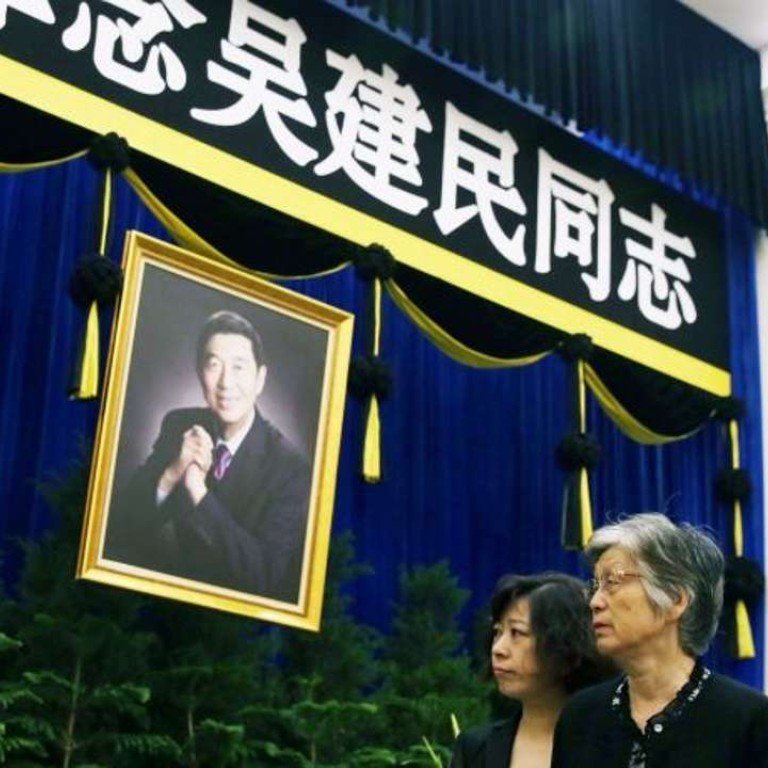
Death of a dove reignites China foreign policy debate
Wu Jianmin tackled hawkish PLA general and nationalistic newspaper editor
On Friday morning, family members, friends, foreign affairs officials and former ambassadors paid their last respects to late Chinese diplomat Wu Jianmin, who died in a traffic accident last weekend.
Visitors at the Babaoshan Revolutionary Cemetery in Beijing were each given a white flower and a brochure detailing the retired diplomat’s life.
Wu, 77, died in a car crash before dawn last Saturday in the central Chinese city of Wuhan, Hubei province.
His view ... about peace and development was right and wise. Such views are not in short supply, but his courage was
Diplomats and generals in the West are commonly identified as doves or hawks, hardliners or moderates, nationalists or globalists. But such terminology was unheard of in the ranks of Chinese officialdom until recently, with open debate about foreign policy rare under communist rule.
Wu triggered such debate among the country’s close-knit circle of diplomatic and foreign policy advisers. And his death has reignited it.
Wu began his diplomatic career in 1959 as a French interpreter for late party chairman Mao Zedong and late premier Zhou Enlai. He also served as China’s ambassador to France, the Netherlands and the UN in Geneva before heading the influential Foreign Affairs University in Beijing, the alma mater of numerous senior diplomats, including incumbent foreign minister Wang Yi.

As a vice-ministerial level official, Wu was not senior enough to have a significant impact on Chinese politics or foreign policy, but his sudden death was a huge shock to the country’s diplomatic community, as he was seen as a representative of conciliatory diplomacy – a dove in Western terms.
He was involved in several high-profile foreign policy debates in recent years, making him a controversial political figure within the establishment and the recipient of acclaim and abuse, even being denounced as a traitor to the Chinese nation.

His public debate with prominent military hardliner Major General Luo Yuan on Hong Kong-based Phoenix Television in 2014, when they argued over the use of force as a Chinese foreign policy option, was a landmark event that triggered a wave of debate across China.
Wu also engaged in an unusual public spat with Hu Xijin, the chief editor of the nationalist tabloid Global Times, after he criticised the paper’s strident coverage and extreme nationalistic tone, saying it had hijacked China’s public opinion and the country’s diplomatic engagement with Japan.

Over weekend, the Global Times said Wu’s diplomatic views had been criticised for being soft. The People’s Liberation Army Daily said in a Weibo post that although there had been disagreements over some of Wu’s views, China needed more diversified expressions of opinion as it continued to open up to the world.
China Daily praised Wu as “a hardcore dove and a solid opponent of nationalism”, and many people have expressed their heartfelt respect for him in the state-run media and postings on social media platforms. His public speeches have been circulated in video form on social media and in print.
Analysts say China’s emerging foreign policy debate reflects divisions inside and outside the establishment amid escalating territorial disputes with China’s neighbours and growing competition with the United States over dominance of regional and global affairs.
“The debate has tended to be very divisive and heated as it comes amid rising competition between China and the US and the territorial disputes between China and its neighbours in the South China Sea and East China Sea,” said David Tsui, an Oxford-educated international relations scholar.
Chengxin Pan, an international relations specialist at Deakin University in Australia, said assertive nationalism seemed to have overshadowed public opinion and that in military circles in the past decade, with external events being viewed as provocative and eliciting strong responses from the Chinese government.
Meanwhile, he said, the “discourse of ‘China’s rise’ has both increased Western anxieties about China, and sparked the rise of arrogance and nationalism in China”.
“In the China context, these moderate views tend to be labelled as ‘dovish’, standing in contrast to the more ‘hawkish’ views, hence the debate between the two camps, if you like,” Pan said.
He said Wu had become a symbol of “rational” and “liberal” views about world affairs and China’s role in them.

“Gradually, even the diplomatic circles and policy and academic circles are not immune to the strong surge of nationalism,” Pan said, adding that Wu’s “ill-timed” death meant “the most prominent dove has departed”.
Zheng Qirong, an international relations historian and vice-president of Foreign Affairs University in Beijing, said Wu had been one of only a handful within the establishment who had dared to risk offending hawks by speaking the truth.
Zheng said Wu had correctly assessed China’s international environment in his debate with hawks over whether the main theme should be peace and development or war and revolution. He also praised Wu for his strong calls for the continuation of the “low-profile” foreign-policy strategy advocated by late paramount leader Deng Xiaoping.
“His view that the main theme of the current world is about peace and development was right and wise,” Zheng said. “Such views are not in short supply, but his courage was.”
Zheng, who served as one of Wu’s deputies at Foreign Affairs University for five years, said Wu had been respected for his thoughts and vision and his departure would be a huge loss for Chinese diplomacy and China’s study of international relations.
Many analysts say Wu’s death has removed one of the most important voices from China’s foreign policy debate, at a time when such wisdom and advice is badly needed. They said Wu’s active promotion of his views in the past two years might have been a reflection of his concern about rising nationalist sentiment within the Chinese establishment and society in general.

